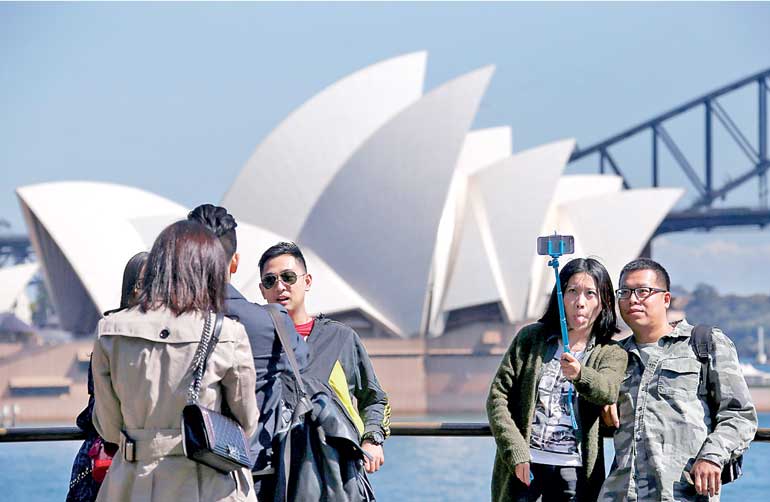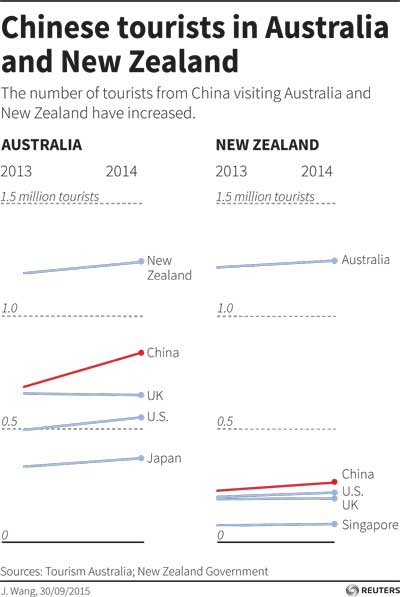Friday Feb 27, 2026
Friday Feb 27, 2026
Thursday, 8 October 2015 00:00 - - {{hitsCtrl.values.hits}}

Chinese tourists take pictures of themselves standing in front of the Sydney Opera House in Sydney, Australia, 28 September. Australia and New Zealand risk losing a global arms race for big-spending Chinese holidaymakers unless they improve their services and infrastructure, jeopardising hopes that tourism will fill the economic hole left by the commodities downturn. While both countries are enjoying record numbers of tourists from China, industry executives warn they need to improve their Chinese language skills and offer better high-end hotels and transport infrastructure – REUTERS
SYDNEY/WELLINGTON (Reuters): Australia and New Zealand risk losing a global arms race for big-spending Chinese holidaymakers unless they improve their services and infrastructure, jeopardising hopes that tourism will fill the economic hole left by the commodities downturn.
While both countries are enjoying record numbers of tourists from China, industry executives warn they need to improve their Chinese language skills and offer better high-end hotels and transport infrastructure.
“We’re number one in terms of where they want to go, but we’re only number 15 in terms of where they actually go,” Matt Bekier, the Chief Executive of casino operator Echo Entertainment, told an American Chamber of Commerce lunch in Sydney this month.
Bekier likened the competition for market share to ‘an arms race’ in which $ 1.3 trillion of tourism infrastructure is being developed around the world.
“Countries are making it easy for people to come and visit not just once but multiple times,” he said. “That’s what we have to compete against. We can’t just sit back and say ‘well our beaches are better’.”
Australia-based Chinese student Enni Guan embodies Bekier’s concerns. Leading her visiting parents and grandmother along a Sydney harbour walk to the world-famous Opera House, she said her relatives never would have made the trip from Guangzhou without her to guide them.
“My parents only go out when I can accompany them,” 23-year-old Enni says, citing the lack of Chinese signage in Australia’s gateway city. “They will never come to Australia again if I am not with them.”
Lost in translation
A rapid increase in Chinese visitors has been welcomed by both countries as they deal with plunging prices for their top export earners – iron ore in Australia and milk powder in New Zealand.
Australia’s resource-based economy is struggling with the demise of a once-in-a-lifetime mining investment boom, with growth below expectations and almost zero in the last quarter.
Driven by Chinese arrivals, tourism overtook coal as Australia’s second-largest export earner last year, raking in A$ 102 billion ($ 71 billion), while in New Zealand it is poised to leapfrog dairy as the top earner.
“This is going to be the next mining boom,” said Bekier, whose Echo, along with rival Crown Resorts, is pinning the success of multibillion dollar new developments in Sydney and Brisbane on high-rolling Chinese gamblers.
New Zealand’s central bank noted that tourism was one of the few supportive factors in the economy when it announced its third consecutive cut in interest rates earlier this month.
“In the past year and half, New Zealand has become a hot destination,” said Stephen Lester, general manager of Ngai Tahu Tourism, where Chinese tourists now account for a quarter of revenues, up from less than 2% four years ago. “Just in terms of pure money in the door, (China’s) really important.”
Tourism Australia expects spending by Chinese tourists to more than double from A$ 5.7 billion last year to A$ 13 billion by 2020. However some believe those estimates are hugely optimistic, given Australia’s lack of readiness.
IHG/Oxford Economics predicts that Australia will not rank in the top 10 markets for forecast growth in Chinese visitors in the next decade.
Plea for help
North of Sydney, the Great Barrier Reef in Queensland State is one of Australia’s biggest tourism drawcards. But even here, many resorts have not been upgraded since a wave of Japanese investment in the 1980s.
The state government is so worried it has issued a plea for foreign investors to take advantage of the weak Aussie dollar and snap up some cheap tourism assets. It has also warned operators of shabby resorts that their leases could be cancelled unless they lift their game.
“We want to see anyone who will actually look at them, refresh them, rebrand them,” Queensland Treasurer Curtis Pitt told a business function in Brisbane earlier this month. “I think it’s well-canvassed that while people are still providing some of the best service in the world, some of the architecture on those things is slightly out of date.”
Student Enni compared Australia’s tourist facilities to her smartphone.
“I upgrade my phone for new features, similarly Australia needs an upgrade,” she said. “In China everything is brand new and flashy, Australia is old.”
